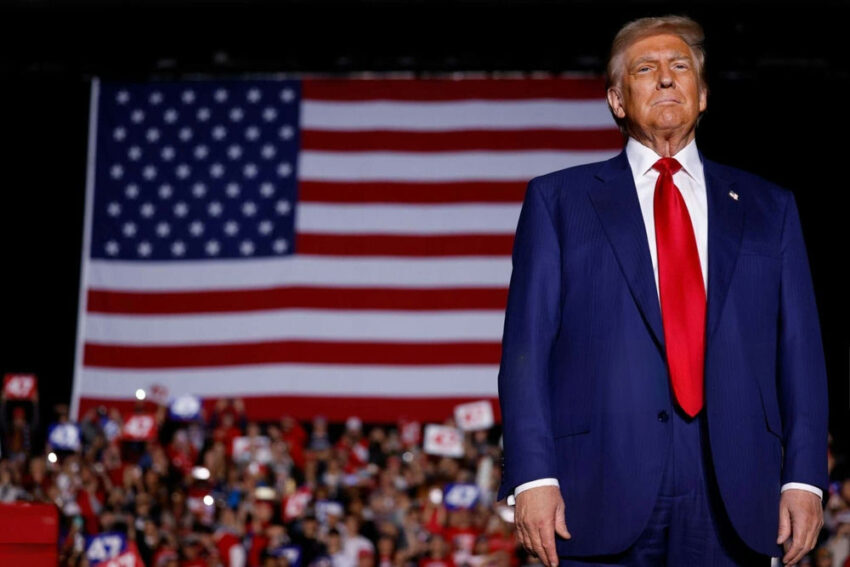Trump warns that Canada’s recognition of Palestinian statehood could wreck the U.S.-Canada trade agreement, sparking fears of a brewing economic storm.
Trade and Diplomacy: A Brewing Storm
In a surprising twist, Canada’s bold decision to recognize Palestinian statehood has thrown a wrench into the delicate machinery of U.S.-Canada trade relations. President Trump, never one to back down from a challenge, has made it clear: aligning foreign policies might just be the cost of maintaining economic camaraderie. With the August 1 deadline fast approaching, this diplomatic move by Canada’s Prime Minister Mark Carney is creating waves that threaten to escalate into a full-blown economic storm.
The United States and Canada, historically close allies and trade partners, find themselves at a crossroads. The recognition of Palestine by Canada has been met with a stark response from President Trump, who has linked this diplomatic decision directly to the ongoing trade negotiations. The threat of a 35% tariff on Canadian goods not covered by the USMCA looms large, a potential blow to the economic stability that North America has enjoyed.
The Economic Stakes
Canada’s economy is deeply intertwined with that of the United States, making any disruption in trade a cause for concern. The bilateral trade volumes between these two nations are significant, and a 35% tariff could have far-reaching consequences. Canadian exporters and U.S. importers are bracing for impact, with industries such as automotive, agriculture, and manufacturing particularly vulnerable. The economic implications of Canada’s recognition of Palestine could ripple through these sectors, causing disruptions that will be felt on both sides of the border.
With the U.S. poised to use its economic might as a tool of foreign policy, the stakes are high. It’s not just about trade; it’s about setting a precedent for how diplomatic disagreements can impact economic ties. The threat of a broader trade war looms, with Canada potentially retaliating, leading to further erosion of trust in the stability of North American trade agreements.
A Precedent for Trade Wars?
The current situation is unprecedented in its direct linkage of foreign policy decisions to trade negotiations. President Trump’s administration has been known for its protectionist policies, and this latest move is no exception. By using tariffs as leverage, the U.S. is attempting to enforce foreign policy alignment, a risky strategy that could backfire. Canada’s recognition of Palestine is a sovereign decision, yet it’s been drawn into the realm of trade, creating a complex web of economic and diplomatic challenges.
The potential for a trade war is real, and the consequences could be severe. The imposition of tariffs could disrupt supply chains, increase costs for businesses and consumers, and strain the relationship between two historically close allies. The automotive, agriculture, energy, and manufacturing sectors are particularly at risk, with global supply chain disruptions a looming possibility if tensions escalate.
The Road Ahead
As the August 1 deadline approaches, both sides are preparing for the possibility of new tariffs. Negotiations are reportedly stalled, with neither side willing to budge on their positions. The U.S. Customs and Border Protection is ready to implement new tariff schedules, highlighting the urgency of the situation. Meanwhile, the Canadian government emphasizes the importance of maintaining stable trade relations, even as diplomatic tensions rise.
The outcome of this standoff could set the tone for future trade negotiations and foreign policy decisions. The intersection of these two areas has created a high-stakes scenario that could reshape the landscape of North American trade. The world will be watching closely to see how this unfolds, as the implications reach far beyond the borders of the U.S. and Canada.
Sources:
Wikipedia: 2025 United States trade war with Canada and Mexico
Trade Compliance Resource Hub: Trump 2.0 Tariff Tracker
USTR: United States-Mexico-Canada Agreement
Holland & Knight: Status of U.S. Bilateral Trade Negotiations
Click this link for the original source of this article.
Author: Editorial Team
This content is courtesy of, and owned and copyrighted by, https://www.conservativecardinal.com and its author. This content is made available by use of the public RSS feed offered by the host site and is used for educational purposes only. If you are the author or represent the host site and would like this content removed now and in the future, please contact USSANews.com using the email address in the Contact page found in the website menu.





